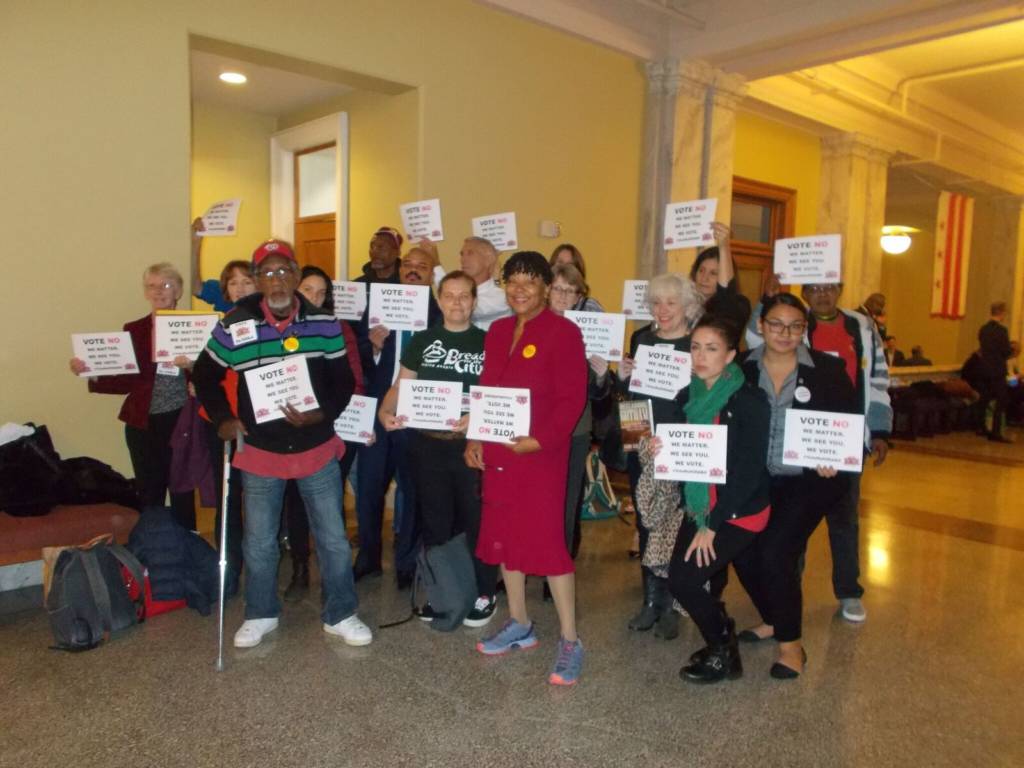The Homeless Services Reform Act Amendment of 2017 was drafted by the Bowser administration and partially informed by a year-long series of community meetings. During that process, it was debated by homeless service providers, government agencies, advocates and people the bill will affect on a personal level.
This legislation covers short-term emergency programs such as Rapid Re-Housing, and long-term medically necessary programs, otherwise known as medical respite. It does not, and will not, fix the affordable housing crisis in its entirety.
At a Nov. 7 meeting of the D.C. Council, all but two councilmembers voted in support of the HSRA legislation. The members who opposed the bill were Ward 8 Councilmember Trayon White and At-Large Councilmember David Grosso, both of whom are members of the Human Services Committee that marked up the bill last month. Before it becomes law, the HSRA amendment must pass a second reading in D.C. Council, be signed by the mayor and undergo Congressional review.
Edith Glasco, a formerly homeless 61-year-old woman, wearing a sticker that said, “Vote no to HSRA,” skipped a doctor’s appointment to ask councilmembers to vote against the bill. She said she currently is sheltered but would likely become homeless again if the bill becomes law. “It’s cold out there now,” Glasco said. “I’m too old to be dealing with this.”
“They don’t care nothing about us,” Glasco said of D.C. Council and the D.C. Interagency Council on Homelessness. “We pay taxes. We don’t have that much, but when we buy food and clothes, we pay taxes. We deserve just as much as they do.”
After the bill was voted on, Ward 1 Councilmember Nadeau introduced an amendment to change the definition of “at-risk of homelessness” to include applicants who are on the verge of eviction but cannot provide documentation from their landlord showing they will be evicted within 21 days. The initial bill required applicants show such formal proof of impending eviction to qualify for assistance. The Washington Legal Clinic for the Homeless had fought for this definition change, pointing out that in D.C., a landlord is often not required to provide a tenant with such documentation. With Nadeau’s amendment, an individual or family now needs only to demonstrate that they were “somehow notified” of such termination. Nadeau’s amendment also changed the language in the definition of homelessness so that individuals or families who have not yet spent a night on the streets will not be excluded from receiving services. In addition, Nadeau’s amendment clarified that a client whose program eligibility is being re-determined has a right to maintain uninterrupted service during the transition and aligned program exits with other termination processes. Nadeau’s amendment passed unanimously.
Chairman Phil Mendelson then introduced an amendment to “ensure that those who have access to safe housing are not considered homeless for the purpose of accessing emergency shelter.” Mendelson’s amendment also ensured that there is protection for individuals or families fleeing domestic violence, sexual assault, and human trafficking. Mendelson added that “if the individual or family provides ‘credible evidence’ that it is impossible to return to such housing, then that overcomes the determination.’”
Grosso noted that Mendelson’s amendment “added language ‘to require an individual or family to prove that they do not own or lease safe housing,’” reminding his colleagues that members of the Human Services Committee had agreed to remove this language because it would create another barrier for people to receive services. After expressing his deep disappointment that there was an effort to add this language back in, he asked Mendelson, if the requirement for credible evidence would be satisfied by a credible oral statement. Grosso explained that his understanding of the Federal HEARTH Act was that an oral statement from an individual or family may help establish credible evidence of a person’s homeless status.
Mendelson said that the standard would permit oral evidence, and such evidence would meet the standard if it was “credible,” but did not say how the word “credible” was being defined in the amendment. Grosso then asked his colleagues to not support the amendment, which he believed would be harmful.
At-Large Councilmember Elissa Silverman asked Mendelson for clarity on what “credible evidence” is. His answers included “The lowest standard that’s available,” “Worthy of belief,” and “It has to be credible.” He did not provide any of sort of definition, which led Silverman to finally ask him what the intent of the bill was, as well as what would be considered credible evidence and what wouldn’t be. She then noted that the Council had a conversation at breakfast and she was surprised by the amendment now because it had not been discussed at that meeting. Mendelson replied, “Yeah, I thought it was funny, because there’s a value to having this discussion here, rather than at the breakfast. The public doesn’t get to sit and watch.”
Mendelson avoided directly answering Silverman’s questions. Finally, he said, “Think of a scale, say, 50-100. 50 being more than every number below that. Between 50 and a 100 are different levels of evidence. Credible evidence is about as close to 50 as you can get.”
Ward 3 Councilmember Mary M. Cheh also attempted to clarify what “credible evidence” means. “If you are on a lease, and it looks like you are on a lease, but someone offers credible, i.e. believable, evidence that you cannot, in fact, use that apartment, for whatever reason, that’s enough. It doesn’t mean that I have to convince you, clear and convincing, or beyond a reasonable doubt, or even a preponderance, all I have to do is present some credible evidence that negates the fact that you are on someone’s lease.”
Silverman said the question of the intent behind this amendment gets to the heart of the issues, because the Department of Human Services has told her that some families are taking up space in emergency overflow shelter placements at hotels, when they could be staying with family or friends.
Mendelson said the intent of the amendment is to “enable the administration to deny eligibility for someone who has safe housing.”
At-Large Councilmember Robert White also opposed Mendelson’s amendment, saying that this was a difficult bill, and this new amendment threw off the balance it had achieved. “If you look at the difficulty, of us on the dais, defining what this is, then I’m not sure how we can expect the people who are supposed to implement this for people coming in seeking homeless services, to define it,” he said. He noted that without a solid definition, there would be arbitrary decision-making depending “on whose desk you sit down at.” He also said that a person showing up and seeking homeless services should be an admission that day if they do not have a place to go, and that they should be taken at their word.
Nadeau voiced support for the amendment, saying that “credible evidence” was the lowest legal standard that gave the administration some room for interpretation. She said she hoped that they moved the bill forward so it could do what it was intended to do, “which is to allow as many people who need to avail themselves of emergency homeless services to do so.”
The amendment passed 8-5 with Grosso, At-Large Councilmember Robert White, Trayon White, Ward 7 Councilmember Vincent C. Gray, and Silverman in opposition.
Grosso then introduced an amendment that would ensure that individuals and families fleeing domestic violence, human trafficking victims, those seeking asylum, and refugees would
not have to demonstrate residency in order to be eligible for emergency shelter. The amendment passed unanimously.
Grosso introduced an amendment to replace an itemized list of documents the HSRA said would be acceptable to prove D.C. residency and qualify for benefits with the phrase, “Any evidence that indicates the individual or family is living in the District voluntarily and not for a temporary purpose and who has no intention of presently moving from the District.” The amendment was rejected, with only Grosso supporting it.
Next, Trayon White introduced an amendment on Rapid Re-Housing that would make a one-time extension of housing support from 12 to 18 months mandatory if the provider could not demonstrate that the individual or family had had consistent case management services, had been referred to other housing programs, and would be able to stay in housing without further help. This would mean that an individual or family who is still struggling financially and has not been able to get back on their feet would have an additional 6 months to do so if they had not yet received the services described above. Without the extension, families who cannot financially recover in 12 months may find themselves unable to pay rent and eventually be evicted.
Nadeau opposed the amendment. “I understand your compassion,” she said, “but at some point, we have to draw the line. This is a short-term program. We have other programs.”
The fiscal impact was called into question, and Grosso stated that Mendelson was holding White’s amendment to a different standard of financial evaluation than the amendments previously discussed and voted on at the meeting. White agreed. It failed to pass 6-7 when, at the last minute, Bonds, the Chair of the Housing Committee, stated: “I have been asked to vote no.” She was asked to do so by Nadeau. Trayon White, Robert White, Grosso, McDuffie, Silverman, and Gray voted yes, with Nadeau, Mendelson, Bonds, Cheh, Evans, Todd, and Allen voting no.
Silverman summed up the meeting best when debating a bill earlier in the meeting, when she said that the hundreds of thousands of dollars they were trying to put toward parking in the Union Market area could be put toward affordable housing. She stated: “We need to put our money where our mouth is.”
A homeless man, who asked to remain anonymous, said, “They say they don’t have any money to put towards services for us. They throw money at other places, then turn around and say that to us.”








